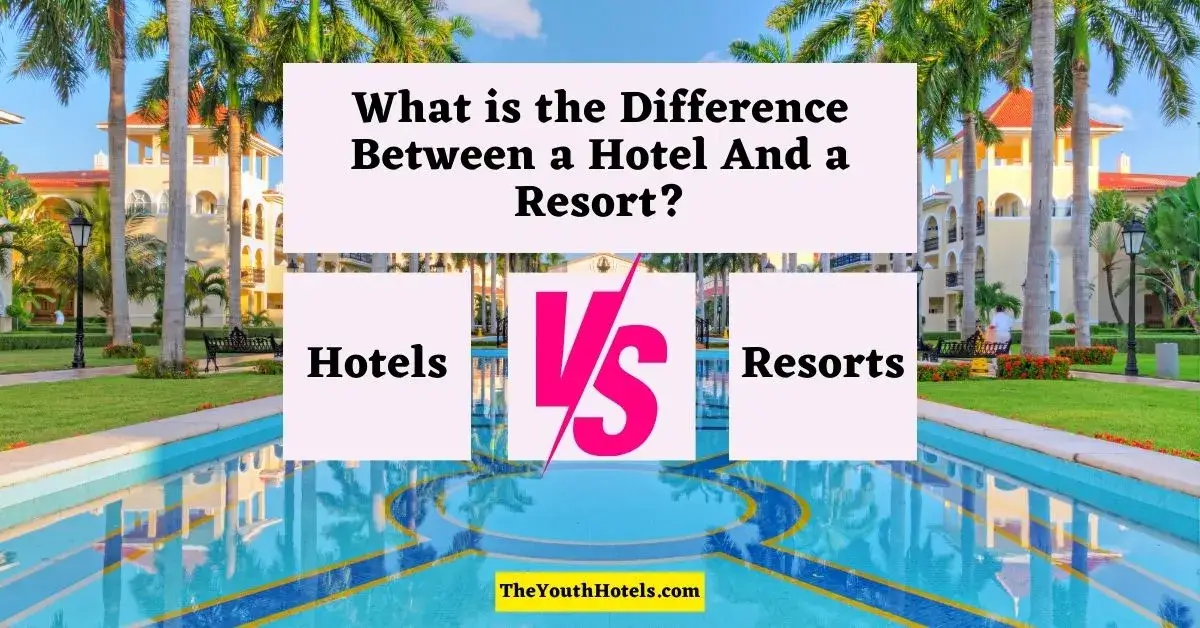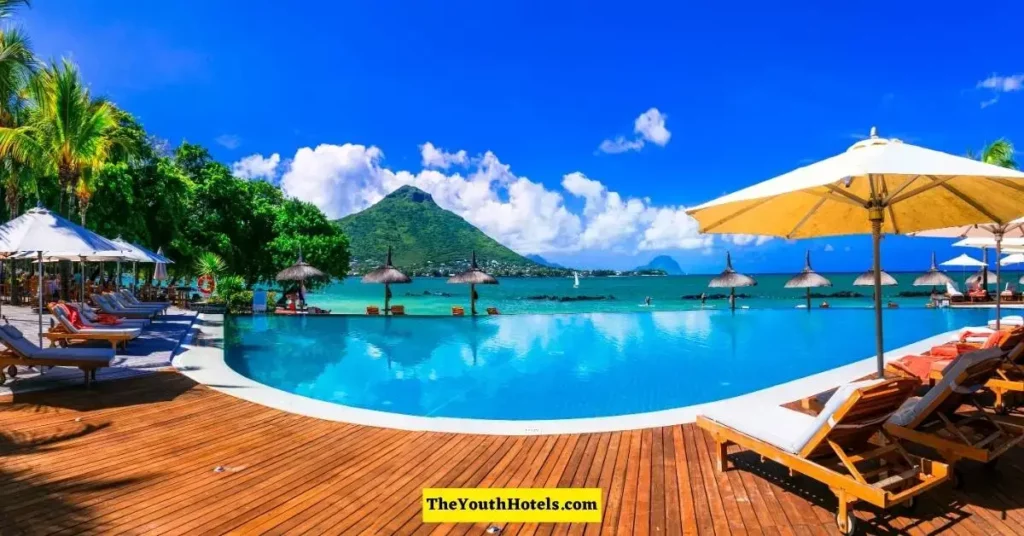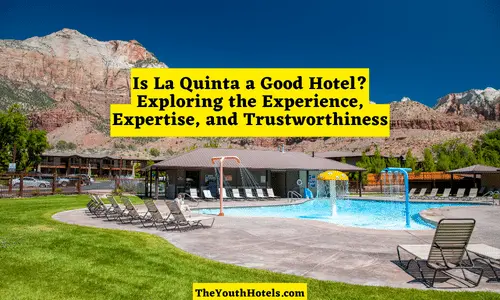What is the Difference Between a Hotel And a Resort?

A hotel offers accommodation for travelers seeking short-term lodging, while a resort provides a variety of recreational facilities in addition to accommodation. The primary difference between hotels and resorts centers around the range of services and amenities they offer.
Choosing between a hotel and a resort depends on the nature of your trip. Hotels are typically chosen for business travel or brief stays due to their focus on lodging and basic amenities.
Resorts cater to those looking for a more extensive vacation experience, offering activities, entertainment, and amenities like spas, pools, and restaurants all in one location.
Resorts tend to be destination-based, allowing guests to enjoy a leisurely stay without needing to venture far for relaxation or fun.
Whether for a quick overnight stay or a luxurious getaway, understanding the distinctions between hotels and resorts can help you select the perfect option for your travel needs.
Navigate Where You Want:
- Key Characteristics Of Hotels
- Definition And Core Concept
- Typical Services And Amenities
- Ideal For Travelers And Short-term Stays
- Comparison Of Different Types Of Hotels
- Resort Essentials Explained
- Defining The Resort Hospitality Model
- Range Of Services And Recreational Activities
- Emphasis On All-inclusive Experiences
- Examples Of Popular Resort Types
- Evaluating Location And Setting
- Hotels In Urban And Transit-accessible Areas
- Resorts Nestled Within Exclusive And Scenic Locations
- The Influence Of Location On Guest Experiences
- Understanding The Guest Experience
- Personalized Service Levels In Hotels
- The Immersive Environment At Resorts
- Why Choice Can Impact Vacation Vs. Business Needs
- Financial Considerations
- Pricing Models For Hotels Vs Resorts
- The Value Proposition Of All-inclusive Resorts
- Cost-effective Options In Hotels For Budget Travelers
- Frequently Asked Questions
- What Makes A Hotel Into A Resort?
- What’s The Point Of Going To A Resort?
- What Does It Mean To Stay In Resort?
- What Is Usually In A Resort?
- Conclusion
Key Characteristics Of Hotels

Understanding the key characteristics of hotels is essential when planning your next trip. Hotels serve as a home away from home for travelers, providing various services and amenities designed for comfort and convenience.
Their primary purpose revolves around offering guests a place to rest and recharge, often on a short-term basis. By exploring these attributes, one can discern the suitability of a hotel to their travel plans and how they differ from resorts, which we will delve into later.
Definition And Core Concept
The definition and core concept of a hotel are rooted in its provision of paid lodging on a temporary basis.
Hotels cater to a clientele that seeks overnight accommodations, typically with a standard of service that includes a private room, en-suite bathroom, and basic necessities such as towels and toiletries.
Typical Services And Amenities
Hotels offer a variety of services and amenities designed to enhance the guest’s stay. Here are some of the most common offerings found across various hotel categories:
- Room Service – The convenience of dining in the comfort of your room.
- Housekeeping – Daily cleaning and tidying of rooms ensure a pleasant environment.
- Concierge – Assistance with reservations, transportation, and local recommendations.
- Business Facilities – Meeting rooms and business centers for corporate guests.
- Fitness Centers – Gyms or workout rooms for health-conscious travelers.
- Laundry Service – For travelers in need of clean attire without the hassle.
Ideal For Travelers And Short-term Stays
Hotels are ideal for travelers who require accommodation for short-term stays. Whether for business or leisure, hotels offer the flexibility of booking for just a few nights, with the option to extend if necessary.
The environment and services provided are tailored to ensure a seamless stay, with staff readily available to address any needs or challenges that arise during the guest’s time at the hotel.
Comparison Of Different Types Of Hotels
| Type of Hotel | Description | Target Audience |
|---|---|---|
| Boutique Hotels | Offer unique charm and intimate settings with personalized service. | Guests looking for a one-of-a-kind experience. |
| Business Hotels | Focus on catering to corporate travelers, with facilities for conferences and work-related activities. | Professionals and corporate groups. |
| Budget Hotels | Provide basic accommodations and services for cost-conscious guests. | Travelers need affordable lodging without extra frills. |
| Luxury Hotels | Renowned for high-end services, premium amenities, and opulent surroundings. | Guests desiring an upscale and indulgent stay. |
Resort Essentials Explained

Resorts are not just about a place to stay; they are about creating an unforgettable experience. They combine the comforts of luxury accommodations with extensive services, recreational activities, and often an all-inclusive package that caters to your every need.
By understanding the resort essentials, you can choose the perfect getaway that offers more than just a room, but a comprehensive vacation destination.
Defining The Resort Hospitality Model
At its core, the resort hospitality model is designed to provide a complete vacation experience within the confines of the property.
Resorts are usually situated in picturesque locations such as beaches, mountains, or lush greenery, providing an idyllic backdrop for relaxation and adventure.
Range Of Services And Recreational Activities
Resorts distinguish themselves by offering a wide range of services and recreational activities that cater to different age groups and interests. Guests can indulge in facilities like:
- Spas for unwinding and rejuvenation
- Golf courses to test your skills in a scenic setting
- Water sports for thrill-seekers
- Children’s play areas ensure enjoyment for all family members
Additional amenities such as fitness centers, swimming pools, and special events only add to the allure.
Emphasis On All-inclusive Experiences
Many resorts are known for their emphasis on all-inclusive experiences. This concept usually includes:
- Accommodation
- All meals and drinks
- Entertainment
- Activities and non-motorized water sports
The goal is to ensure that guests can enjoy their vacation without worrying about additional costs accumulating outside of the initial price.
Examples Of Popular Resort Types
There are various types of resorts catering to different preferences and locations, such as:
| Type of Resort | Primary Focus |
|---|---|
| Beach Resorts | Offer access to sandy shores, ocean activities, and a marine ambiance. |
| Ski Resorts | Located near ski slopes providing facilities for snowboarding, skiing, and other winter sports. |
| Golf Resorts | Centered around golf courses and includes golfing as a key amenity. |
| Spa Resorts | Focus on health and wellness with spa services, fitness classes, and nutritious cuisine. |
Each type of resort presents a tailored experience that aligns with its guests’ interests, whether they seek adventure, relaxation, or both.
Evaluating Location And Setting
When choosing between a hotel and a resort, one of the fundamental differences lies in their respective locations and settings. This aspect is not just about the aesthetics but also about the convenience, purpose, and overall ambiance that one might seek during their stay.
Here, we evaluate how the distinct characteristics of hotel and resort locations shape guest experiences and expectations.
Hotels In Urban And Transit-accessible Areas
Hotels are commonly situated in the heart of the action, including urban centers, business districts, and major transportation hubs like airports and train stations. This strategic positioning offers guests a practical stay option for a variety of purposes, including business trips, urban tourism, or stopovers on longer travel itineraries.
- Convenience for business travelers: proximity to conference centers, business precincts, and meeting venues.
- Ease of access to city attractions: museums, historical landmarks, shopping, and dining, all within reach.
- Optimal for short stays: offering efficient check-ins and check-outs with transportation readily available.
Resorts Nestled Within Exclusive And Scenic Locations
Resorts provide a scenic escape in exclusive locales, often outside of bustling urban areas. These settings are chosen for their natural beauty, be it a beachfront, mountain range, or secluded island, creating an environment that highlights relaxation and leisure.
- Escape to tranquility: distant from the urban commotion, resorts offer a peaceful environment.
- Diverse leisure activities: on-site amenities such as golf courses, spa services, and water sports.
- Luxurious settings: featuring expansive grounds, garden spaces, and custom-tailored experiences.
The Influence Of Location On Guest Experiences
The location of a stay significantly drives the type of guest experience. Hotels are geared towards travelers looking for convenience, accessibility, and familiarity within a cityscape. In contrast, resorts cater to those seeking a more immersive experience, often providing a thematic retreat focused on relaxation, luxury, and on-site entertainment.
| Location Type | Convenience | Experience Focus |
|---|---|---|
| Urban Hotel | High | City Exploration, Business |
| Secluded Resort | Medium to Low | Relaxation, Leisure Activities |
Understanding The Guest Experience
When choosing a destination for travel, whether for leisure or business, the type of accommodation plays a pivotal role in the overall experience. The choice between a hotel and a resort can alter a trip’s feel, convenience, and satisfaction.
Understanding the nuances in the guest experience at each can help travelers make informed decisions that align with their expectations and needs.
Personalized Service Levels In Hotels
Hotels often stand out for their personalized service. Guests can expect a tailored approach to their stay from the moment they check in until their departure.
Attention to detail is paramount and manifests in various ways:
- Concierge services that assist with local bookings, travel arrangements, and personalized recommendations.
- Room customization to accommodate special requests, dietary needs, or sensitivity to allergies.
- Business facilities equipped with high-tech features suitable for meetings and conferences.
Each staff member, from the front desk to housekeeping, plays a role in crafting a seamless experience catered to individual preferences, exemplifying the hotel’s commitment to exceptional service.
The Immersive Environment At Resorts
Resorts are designed to offer an immersive environment, where the setting contributes immensely to the guest experience. These all-encompassing spaces entice guests with a plethora of onsite activities, such as:
- Cultural programs showcasing local traditions and crafts.
- Outdoor adventures, including water sports, hiking, and eco-tours.
- Wellness amenities, including spas, fitness centers, and holistic retreats.
The layout and vibe of a resort aim to create a distinct sense of place, encouraging guests to unwind and indulge within the comforts of the property. The focus extends beyond the rooms, placing a greater emphasis on the variety of experiences available within the resort’s expansive grounds.
Why Choice Can Impact Vacation Vs. Business Needs
Selecting the right accommodation can significantly affect the outcome of a trip be it for relaxation or work. On vacation, travelers might prefer a resort’s array of leisure activities, allowing a stress-free escape without the need to venture out.
In contrast, business travelers could favor the efficiency and professionalism of a hotel, with its proximity to urban centers and business facilities. Consider the following:
| Vacation Needs | Business Needs |
|---|---|
| Relaxation and entertainment on-site | Convenient location and transport links |
| Family-friendly amenities and programs | Meeting rooms and office services |
| Space to unwind and disconnect | High-speed internet and workspaces |
The decision between a hotel and a resort is not one-size-fits-all but rather a reflection of the desired balance between convenience and indulgence. Identifying specific preferences and trip objectives can guide this choice and enhance the overall stay.
Financial Considerations
When exploring your next vacation, understanding the financial considerations between choosing a hotel or a resort is pivotal. It’s not just about the nightly rate, your decision can affect the entire budget of your trip.
Here we will dissect the cost structures that set hotels and resorts apart, look into the value resorts may offer, and guide budget travelers toward cost-effective hotel options.
Pricing Models For Hotels Vs Resorts
Hotels and resorts offer distinctly different pricing models, catering to a variety of traveler needs and financial plans.
Hotels typically operate on a per-night basis, presenting costs upfront for the room you select. These prices can fluctuate based on location, amenities, and time of year.
On the other hand, resorts often bundle the accommodation cost with additional features like meals, entertainment, and activities, which can lead to higher initial pricing but potentially more savings over the course of your stay.
The Value Proposition Of All-inclusive Resorts
All-inclusive resorts could be the jewel in the crown for those seeking a hassle-free vacation experience. Initially, the price may appear steep, yet these resorts justify the cost by incorporating accommodations, meals, drinks, and often various activities and amenities into a single price.
This model can offer tremendous value, especially for families or travelers who plan to take full advantage of the provided services.
Cost-effective Options In Hotels For Budget Travelers
For budget-conscious travelers, hotels can present a smorgasbord of cost-saving opportunities. The key lies in selecting accommodations that align with your needs, without paying for extras you won’t use.
Many hotels offer basic rooms with the chance to choose add-ons à la carte, enabling guests to tailor their expenses.
Additionally, staying at hotels frequently comes with perks like free WiFi, complimentary breakfast, or access to a kitchenette, which can reduce overall food costs and appeal to economical travelers.
Frequently Asked Questions
What Makes A Hotel Into A Resort?
A resort distinguishes itself from a hotel by offering a variety of on-site recreational facilities, extensive amenities, and leisure activities, typically in a picturesque vacation-oriented setting.
What’s The Point Of Going To A Resort?
Resorts provide a getaway for relaxation, offering amenities like spas, pools, and gourmet dining. They cater to guests seeking entertainment, adventure activities, and comprehensive vacation packages in one location.
What Does It Mean To Stay In Resort?
Staying in a resort means booking accommodation at a full-service lodging facility that typically offers extensive amenities, such as dining, entertainment, and recreational activities, all within the property premises.
What Is Usually In A Resort?
A resort typically offers lodging, restaurants, entertainment amenities, pools, spas, and recreational activities.
Conclusion
Distinguishing between hotels and resorts is crucial for your perfect getaway. Hotels offer convenience and practicality, while resorts provide an escape into leisure and luxury. Remember your preferences and needs when booking, as each offers a unique experience designed to cater to different desires.
Choose wisely and enjoy your stay, no matter the type.
Also Read:





